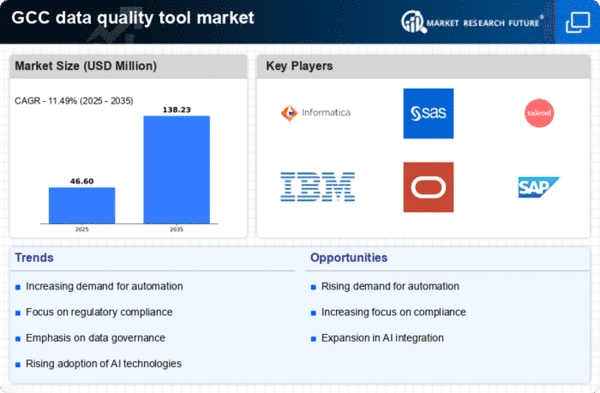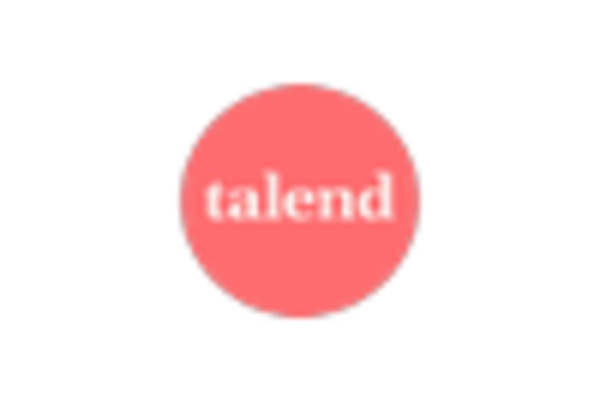Adoption of Cloud-Based Solutions
The shift towards cloud computing in the GCC is significantly influencing the data quality-tool market. Organizations are increasingly adopting cloud-based data quality solutions due to their scalability, flexibility, and cost-effectiveness. This transition allows businesses to manage their data quality processes more efficiently while reducing the need for extensive on-premises infrastructure. As cloud adoption continues to rise, the demand for cloud-based data quality tools is expected to grow, with a projected increase of around 20% in the next few years. This trend indicates a shift in how organizations approach data management, making the data quality-tool market a critical area of investment for companies looking to enhance their operational efficiency and data governance.
Rising Importance of Data Analytics
The growing emphasis on data analytics in the GCC is driving the demand for data quality tools. Organizations are increasingly relying on data-driven insights to inform strategic decisions, making the accuracy and reliability of data paramount. As businesses invest in analytics capabilities, they recognize that poor data quality can lead to flawed insights and misguided strategies. Consequently, the data quality-tool market is poised for growth, with an anticipated increase of approximately 18% over the next few years. This trend underscores the necessity for organizations to implement robust data quality solutions to support their analytics initiatives, ensuring that they can leverage high-quality data for competitive advantage.
Increased Data Volume and Complexity
The exponential growth of data generated by organizations in the GCC is a key driver for the data quality-tool market. With the rise of big data, businesses are faced with the challenge of managing vast amounts of information from diverse sources. This complexity necessitates the use of advanced data quality tools to ensure that data remains accurate and usable. According to recent estimates, the volume of data generated in the region is expected to increase by over 30% annually. As organizations strive to harness the power of data analytics, the demand for effective data quality solutions is likely to rise. This trend indicates that the data quality-tool market will continue to expand as companies seek to improve their data management practices and derive actionable insights from their data.
Emphasis on Enhanced Customer Experience
In the competitive landscape of the GCC, businesses are increasingly recognizing the importance of delivering exceptional customer experiences. The data quality-tool market is benefiting from this trend, as organizations seek to leverage accurate and reliable data to better understand customer preferences and behaviors. By utilizing data quality tools, companies can ensure that their customer data is clean, consistent, and up-to-date, which is crucial for personalized marketing and service delivery. This focus on customer-centric strategies is driving investments in data quality solutions, with the market projected to grow by approximately 15% over the next few years. As organizations prioritize customer satisfaction, the data quality-tool market is likely to see sustained growth as a vital enabler of effective customer engagement.
Growing Regulatory Compliance Requirements
The data quality-tool market is experiencing a surge in demand due to increasing regulatory compliance requirements across various sectors in the GCC. Organizations are compelled to adhere to stringent data protection laws, such as the General Data Protection Regulation (GDPR) and local regulations. This necessitates the implementation of robust data quality tools to ensure data accuracy, consistency, and reliability. As a result, businesses are investing significantly in data quality solutions to mitigate risks associated with non-compliance, which could lead to substantial fines. The market is projected to grow at a CAGR of approximately 12% over the next five years, driven by the need for compliance and the protection of sensitive information. Consequently, the data quality-tool market is becoming an essential component of organizational strategies in the GCC.
















